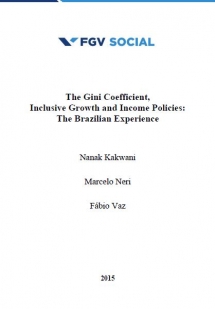
The Gini Coefficient, Inclusive Growth and Income Policies: The Brazilian Experience - Kakwani, Nanak, Neri, Marcelo Cortes, Vaz, Fábio Monteiro
Sobre o paper:
ABSTRACT
This paper analyzes the relationship between growth patterns in mean income, inequality and social welfare in Brazil during the last two decades. It focuses on the role played by changes in different income sources. From a methodological point of view, the paper derives a dynamic decomposition using the Gini coefficient which is the most widely used measure of inequality found in the literature. One contribution is the proposal of a measure of social welfare growth, departing from the specification proposed by Sen (1974). Our dynamic social welfare decomposition links growth rates in mean income and in income inequality measured by the Gini index. The other contribution is a decomposition methodology that explores linkages between these components and different income sources from labor earnings to different social programs. Every income source mean and inequality changes are mapped into social welfare changes. The proposed methodology is applied to the Brazilian National Household Survey (PNAD) covering the period 1992-2012. The empirical analysis demonstrates that some Brazilian official income policies such as Bolsa Família played an important role in promoting income growth among the poorest segments while others such as other poverty alleviation policies such as BPC and also Social Security benefits are much less well targeted. Overall the paper shows that labor income played the leading role to explain changes in both mean income and inequality in Brazil.
REFERENCES
This paper was published in:
Site
KAKWANI, Nanak; NERI, Marcelo C.; VAZ, Fábio M. The Gini Coefficient, Inclusive Growth and Income Policies: The Brazilian Experience. 2015. FGV Social. Available online at: <https://cps.fgv.br/en/gini-coefficient-inclusive-growth-and-income-policies-brazilian-experience>




